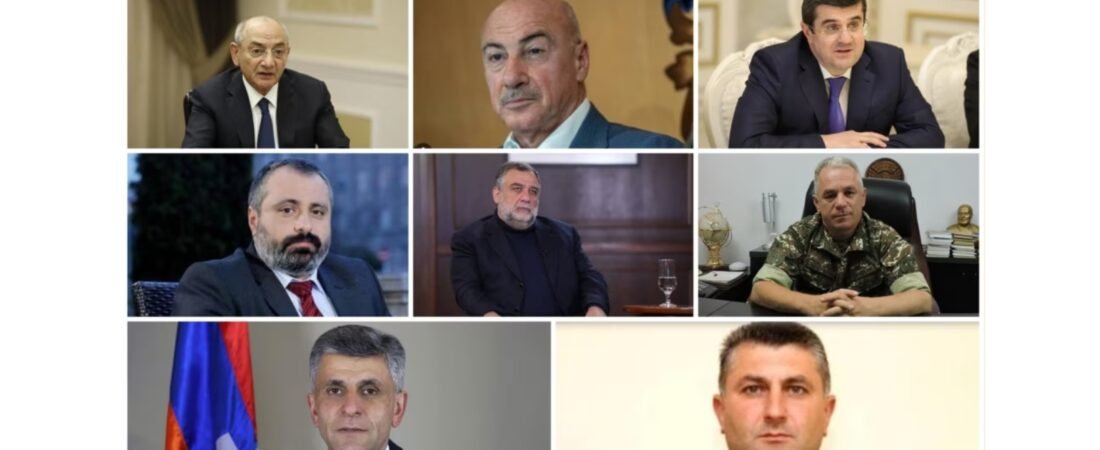The months-long fake trial held in Baku’s court demonstrated that the Armenian prisoners of war had no connection even with the testimonies given by Azerbaijani witnesses, and that the acts attributed to the Armenians sitting in the defendants’ dock were not proven, Siranush Sahakyan, the legal representative of the Armenian captives at the European Court of Human Rights, told “Azatutyun” (RFE/RL Armenian Service).
“First of all, identical testimonies were being given, and everyone confirmed that they did not personally know or have any contact with the Armenians who were on trial. This is a very important point, showing that the so-called evidence did not establish any objective link to the alleged acts and did not represent an actual reconstruction of events,” she said.
The trial concerning the military-political leadership of Artsakh (Nagorno-Karabakh) and other Armenian captives has concluded. According to the Azerbaijani state media, closing statements by the prosecution are expected to begin next week.
“We are dealing with abstract accusations, but no direct connections were established between specific defendants and the alleged acts, or between the accused and the supposed victims or events,” Sahakyan added.
The court sessions took place without the presence of independent media or representatives of international organizations. The only source reporting on the hearings was the Azerbaijani state-run agency “AzerTac.”
Human rights lawyer Sahakyan insists that the entire process was purely formal, with both the statements and verdicts written in advance. “Of course, we can already predict the verdicts – they will be guilty verdicts with the harshest possible sentences, which are essentially the result of a political order,” she said.
One of the clear indicators of the fabricated nature of the trial, according to Sahakyan, is that the prosecution was given only two days for its closing speech — whereas a judicial process of this scale would normally require weeks. She predicted that the verdicts would be announced by the end of the year.
“The key question is how to ensure these violations are documented and subsequently receive an adequate international response — including through international judicial decisions. The goal is to eliminate these unlawful verdicts from the legal system, to neutralize them, and the only way to do so is by challenging the process in supranational or international courts. These bodies should examine the violations we have repeatedly raised publicly and give them legal recognition — declaring the verdicts illegitimate,” Sahakyan emphasized.
When asked whether Prime Minister Pashinyan’s government — which seeks to sign a peace agreement with Azerbaijan — would appeal these verdicts and work in international courts to have the Azerbaijani judgments declared illegitimate due to violations of the right to a fair trial, Sahakyan responded: “If developments occur, such as the government’s possible withdrawal from interstate complaints, I believe that the families must organize themselves and, using their own means, independently pursue the protection of their rights.”
Vardanyan’s trial will also soon near its end
The trial of Ruben Vardanyan, one of Artsakh’s former high-ranking officials, is ongoing. According to human rights lawyer Siranush Sahakyan, his trial will likely reach its final stage within a few weeks. Ruben Vardanyan was the only Armenian captive who had hired an Azerbaijani lawyer with his own resources. Ten days ago, he dismissed his lawyer, declaring that the trial was a farce and that he had been deprived of his right to a defense.
The former State Minister of Artsakh also has an American attorney, but he has not been allowed to enter Baku. Armenian captives are deprived of access to independent legal defense and visits from international organizations. The International Committee of the Red Cross had been the only channel of contact with the prisoners, but even that has now been blocked in Baku.
“November 4 is the deadline for the Azerbaijani government to submit a report to the European Court of Human Rights regarding the conditions of detention and other circumstances concerning the captives. Therefore, we are waiting for the deadline to pass, after which we will review the documents provided and draw conclusions based on their content,” Sahakyan emphasized.
The Armenian captives held in Baku prison — 23 in total — are charged under serious criminal articles. High-ranking Armenian officials assure that all efforts are being made to secure their repatriation, but that issue was not included in the Armenia-Azerbaijan agreement signed on August 8.
During a meeting at the White House with Prime Minister Nikol Pashinyan, U.S. President Donald Trump promised to raise the issue of the 23 Christian captives with Azerbaijan’s president. However, there has been no official information about any action taken following that statement.

